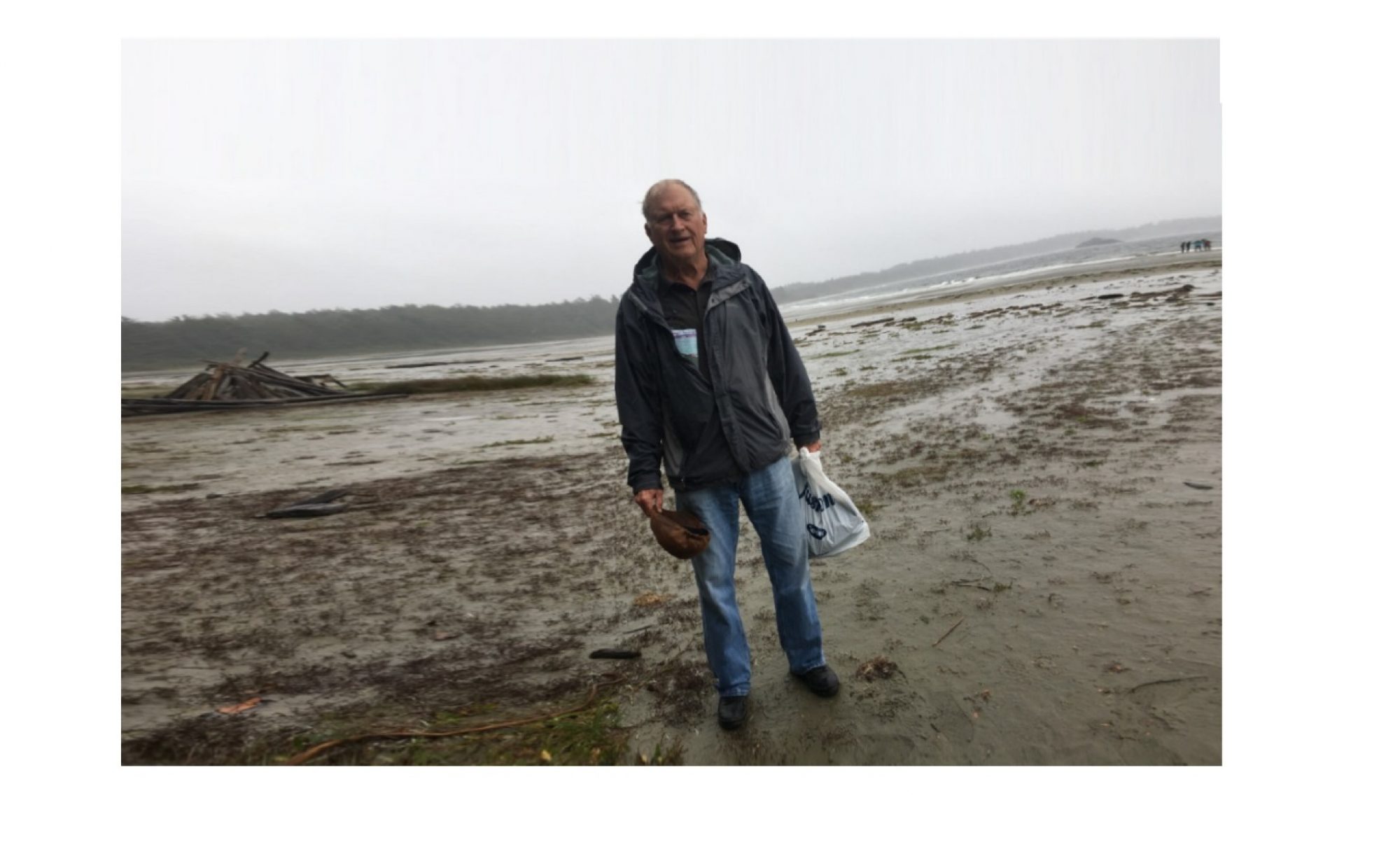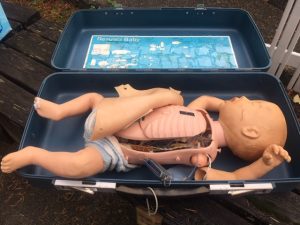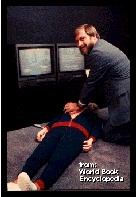I arrived from Seattle about 10 at night, and got to her bedside about 11. This spring she was in a nursing home in Minneapolis. I hoped she would still be alive, and I think she was. Charlie, beside her still, said she could hear what I said, but I became tongue-tied and hoped she could read my thoughts. She had loved Charlie in her way, but as in many long marriages, he probably loved her more. I said a few awkward things. Her mouth was slightly open with her head tilted back. Her eyes were shut. It was not sleeping. By midnight, the grief counselor came in and said she was dead.
My mother and father went to Central High School in Tulsa, Oklahoma together, and then to the University of Oklahoma together, and married after both finished college. Both had been only-children at a time when most families were larger than they are now. My father, Clint, went to work in the petroleum industry as a geological engineer. My mother, Daphne Mae, had a degree in teaching, but in that time, she stayed home and had a son…me. They were young and attractive, and ripe for the future America to embrace them. All of this was pretty standard stuff for the early 1940’s – and then all hell broke loose. World War II began sucking up males, even to age 40, and making them into machine gunners and truck drivers and napalm spreaders and artillery gunners and …pilots. They needed lots of pilots. The U.S. was throwing pilots at the European fan blade as fast as they could replace the ones being shot down. After my father’s graduation from flight school they trained him to fly B-17s and almost immediately shipped him to England. That was 1943.
They say it was a virtual meat grinder in the air above Belgium and Holland and France. People watched the air wars from roofs of the towns below and cheered for their airplanes to triumph or cried as they went down in flames. Kids on bikes rode across fields to locate and possibly direct English and American flyers to safety before the local police got to them. German news broadcasts exaggerated the number of enemy killed, and the British Broadcasting Corporation underplayed the number of Germans planes downed, so everyone listened to the BBC for the true accounting. (This made it much easier for the Allies to impart false information when deception was critical to a mission, such as D-Day.)
My mother waited with thousands of other mothers with small children, watching and listening to every bit of news and meeting the postman halfway down the front walk every day. She stopped hearing from him early in 1944, and I guess that was the worst. She knew he would write every day if he could, and apparently now he couldn’t. After a year during which her Clint was missing, and another year after the end of the war when he was pronounced dead, she lived with her mother and father in Tulsa and, of course, with me. My mother never taught at any school though she went to University to be able to teach. Instead she taught me, to read when I was four, to write my own letters shortly thereafter. This was the first of the huge gifts my mother gave me.
Another of course, was her eventual marriage to Charlie, my father’s best friend in High School and later. He was an airline mechanic when air travel and air shipping was taking off (so to speak) across the world. This marriage gave me a stable loving home at a time when young attractive widows were virtually hiding their young children at the grandparents, and looking for a way to begin new lives with new husbands in a world that had dissembled their future. Little could I know then, as prince of my little world, cherished among many relatives, that thousands of graves were lost across the swath of Europe, and some families went decades before they learned any truth about their missing sons and fathers.
I was more than a bit sickly, (they thought it was perhaps some kind of pre-polio) and with little more urging from her I became a voracious reader. They tested us in the second grade and, truly because of her, I had the reading skills of a 6th grader. When most kids were being read to, she was asking me questions about things I had been reading. When most kids were struggling with Dick the Cat, I was reading the Reader’s Digest and anything lying around a doctor’s office, and finally popular books I scarfed up from the various relative’s houses and finally from the library. (Later I instructed other second graders out of “The Marriage Manual” which gave us all an oddly pedagogical taste of a forbidden literature. It helped that there were pictures.)
Then there were little things that were not so little. It was scorching hot on the beach at Lake Minnetonka, and lots of people were picnicking and generally enjoying the cool of the water. I casually walked out from the shore, apparently not aware I could not breath water. It was all very interesting, the half bodies walking along the bottom with the sharp division of light at the surface above me. I was a whole little body, just walking along the sandy bottom with my head out of the water — until it dropped off. It was all calm and not at all eerie standing there under the water, until I saw this flash of a white summer dress splashing in, spread out on the water and my mother’s cloth-draped body stretching for me under the water. She lifted me up and made our way back to the beach. Everyone onshore seemed concerned and came to look close up into my face. My sopping wet mother hugged me to her as I coughed up the pesky water. I will always remember her as that shape in the water moving toward me snatching me from the bottom as I looked up toward the shimmery plane of the surface.
My mother started a new family with Charlie and I watched curiously at this fresh creature – my little brother Dan — and everyone’s delighted reaction to everything he did. Luckily I had my books, so they could have their baby talk and rollarounds on the carpet. Even with taking care of a brand new baby, my mother would always come in and talk to me about what I was reading. At the dinner table I was the little boy who talked too much, asked too many questions. Charlie made jokes about it, and my mother often defended me, but clearly I was the odd man out.
During those years where I was her main project, even with my brother Dan about to roll over, she also taught me a little music. She had played the piano when younger, and still had some good chords in her. She discovered I had near perfect pitch, and could copy her note for note. Later she gave me piano lessons, but my eye hand coordination was still slow, as it has been except when circumstances called for lightning reflexes – a curious counterpoint. In the fifth grade some music teacher at school tested my ear, and said I should be playing the cello, but I did not know what a cello was and the school band was not nearly as interesting as the sports teams to which I aspired but could barely keep up with. In our family, sports were of little or no concern, and I went along without much support.
Along about the fifth grade, they started having us do speeches in class. Here my mother made perhaps her greatest contribution to my life. She could have been a movie director, I think, or a record producer. I would write the presentation, but she would enhance it, sharpen it, intensify it at just the right places. She taught me to communicate the words I had written in a clear but almost conversational tone, emphasizing my points but not waving my arms or pointing at anything or using any of the trite gestures that were common at the time.
This home-coaching stood me well in talks I made throughout junior high and high school when the occasion required, and in my high school commencement speech, which I had achieved through contest. She coached me, critiqued me, and gave me a skill which lasted a lifetime. Ever after I could speak to 1000 people as if I was talking across a coffee table. I could even entice a crowd in Las Vegas to play an interactive shell game on the large screen projection with me, and afterward to to have them chant “Power to the People” with me – a theme I used for explaining my new interactive media. (The speaker after me swore he never wanted to follow me on a program again.) I was even an invited speaker on a TED program in Charleston, run by the legendary Richard Saul Wurman, back in the days when you practically had to be Jonas Salk to get on the program.
This ability – and my confidence with it – was clearly handy when I went out on the road to talk about the CPR system at 20 conferences a year, and to raise money for the project with possible investors. I was not a showman, not a hawker. I could just talk to a large crowd as if they were sitting in a coffee shop with me. As a personal admission, sometimes I was more comfortable talking with a crowd than to a few individuals, because as any comedian knows, with a crowd you can always move your attention away from the potential naysayers with the first tilt of their heads with the first negative response.
When I was in college, she thought I should join a fraternity, as my father had. She also thought I should cut my hair. It was all in the interest of making me a better man someday, but I exploited the fraternity for free parties and numerous meals, and spent the money for a haircut on burgers with a few friends. I was a miserable son at times…I know that…but never so much as when I went to war.
Whatever came of life I was always her first born, her love child. When I was about to be shipped out to Vietnam with the Marines, she found out that as a sole surviving son of a combat deceased, it could be illegal to send me into combat. Now that I see things with more sympathy, I know she did not want to experience the same thing twice in life. She even went to Walter Mondale, the Minnesota senator at the time, and pled her case. I had hoped there would be no options here, but I believe he may have reinterpreted a law. Anyway, he told her the decision should be mine. There it was, my option. I was convinced the right person in a bad situation could make a great difference. Shortly before, I had been teaching creative writing at a free university in Seattle, and the rebel in me rebelled at “Make love not war” on one wall, and Che Guevara leading the guerillas on the other wall. It was balderdash. I though with some regret that I should be where my actions would count for something. I went, despite her pleading, and I was right. You can make a difference if you are where it matters.
The day before my mother’s parting ceremony at their church in Minneapolis, the minister of the church met with the family to explain the presentation, and to arrange any comments about the deceased. Charlie voiced up: “David, you were always the one who could talk. How about you doing the comments?” This was not at all a compliment. My brother and sister and Charlie – usually fairly outspoken individuals – were terrified at any thought of speaking in public. I saw it another way.
“You lived with her, you all loved her. If none of you will say a few words, then no one should.”
They were mum. No one was going to step forward on that platform, even for a minute, even for love.
I turned to the minister. “Then I guess no one will.”
There was silence amongst the family then, but I did not feel resentment. They were just who they were, and anyway, I knew my mother would know what I would have said, and how I would have said it.
Also, take a look at this article about diamond and core drilling services. Read on to learn more about it. Visit https://www.mydiamonddrillinglondon.co.uk/ for more details.


